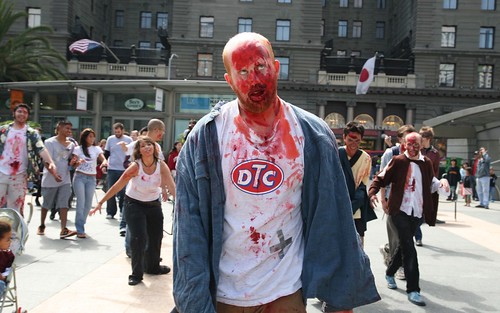
Last night, a few friends and I were discussing what in our culture makes zombies so big right now. My favorite (somewhat tongue in cheek) argument, from Charles, was that it’s about our politics.
“There’s this horrible group of people who just don’t get what America is about. They’re mindlessly destroying everyone and everything. And they’re winning.”
This is the narrative that everyone in the country — the left, the right, and the centrists and apolitical sorts who are repelled by strong partisans — has come to believe in the last 5-10 years, just as zombies have become our favorite national horror monster.
P.S. Of all the amateur zombie walk makeup jobs I saw looking for a photo to go on this post, this one was the most impressive, by which I mean, looks the grossest, so check it out at your own risk.



Speaking of zombies, there’s some guy named “Barry” posting on your blog. He sounds like of like you but he’s obviously an impostor because he posts a bunch of gibberish about art and stuff instead of politics.
*KIND of like you. Stupid lack of edit function.
Maaaaaaaybe.
There’s definitely political metaphor in zombie and vampire mythology, and I find the anthropological analysis of it being related to globalization very convincing. It’s not just America, though; I would be surprised if it was something as local as democrats versus conservatives.
The idea that our political opponents are mindless idiots who will destroy everything isn’t a particular product of the current era, it goes back for ages, so it doesn’t explain why zombies are so popular now.
I think there are defininite (and worrying) political repercussions of the popularity of zombies, particularly the accepted story of a zombie apocalypse and the way survivors choose to govern themselves. But I think the popularity of zombies isn’t due to any political factor, or at least, not an overtly political factor. It’s simply a way for people to parrot a bunch of cliches while seeming subversive. Personally I can’t wait for the whole stupid thing to end. There have been a few good things to come out of the late-noughties zombie wave, but I could count them on the fingers of one hand.
Mandolin,
Do you have links or book suggestions for the anthropological analysis? I’d be interested in reading other people’s interpretations of the zombie cultural phenomenon.
http://www.amazon.com/Speaking-Vampires-History-Colonial-Studies/dp/0520217047
I can’t remember if this has an analysis of zombies/witches in it, too, or if it was an addition by my instructor(s).
Somewhat related: http://www.strangehorizons.com/2007/20070402/trimarco-icke-a.shtml
Mandolin,
Ah, so not analysis of the current trend.
Actually, I think my interpretation can be boiled down to corporate power in a way.
The reason we all feel like our side is losing is because it is. We are just confused about who the other side is, failing to notice that the super-rich and the corporations are playing “let’s you and her fight” between various groups (e.g. liberals and tea-partiers). We see that we are losing, so we assume the other side must be winning (and we see the ways in which the other side’s desires align with global corporate power, and therefore those desires are winning: liberals want cosmopolitan culture and equal rights for gays and lesbians? hey, so do the corporations! tea partiers want a gutted social safety network and limited regulations? hey, so do the corporations!), but while we may celebrate our sides limited victories, we are all simultaneously aware that the corporations have made our lives more unstable, more anxiety filled, and that anxiety makes us feel we are losing (and also makes the fear of total collapse of our lives and our communities into something empty and ravenous and violent nicely representable and commodifiable as zombie fictions).
Hugh,
I do think the current feeling that we are losing being prevalent on all sides is a new phenomenon in my lifetime, which roughly corresponds to the great stagnation of the ‘oos.
“Actually, I think my interpretation can be boiled down to corporate power in a way.”
Yeah, altho I think colonialism/imperialism has its role, too.
Sorry I misread you or responded to something you weren’t arguing or both.
Somehow I think this explains a lot.
Theories of International Politics (& Zombies)